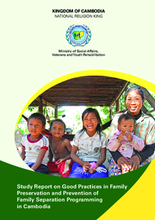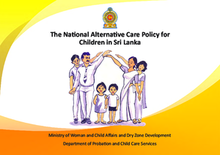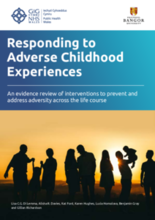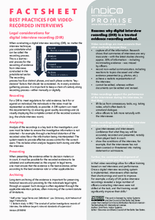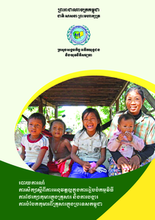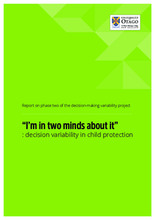Displaying 371 - 380 of 1070
This report provides in-depth analysis of programs of 7 different NGOs in Cambodia working on the prevention of family separation and family preservation in order to respond to risks related to physical and mental well-being and domestic violence.
This module is the second part of the Parenting without Violence Bronze Course. It focuses on the course's second learning outcome by sharing more about HOW Parenting without Violence works.
Sri Lanka's National Policy on the Alternative Care of Children outlines a comprehensive range of alternative care options and encourages the reforming of all formal structures that provide at-home and out-of-home services for children deprived of care and protection or at risk of being so. This policy also extends to children under care of the Juvenile Justice System. It provides policy solutions to programming for children at risk of family separation and facing deprivations such as child abuse, neglect, child labor, poverty, addiction, imprisonment, human trafficking, mental and physical disabilities, HIV/AIDS, domestic violence, orphanhood, abandonment and displacement etc. The policy also takes into consideration and encompasses provisions to children who are forced to live and work on streets.
To support innovation in addressing adverse childhood experiences (ACEs), the authors have undertaken a review of evidence on common approaches to prevent ACEs and/or mitigate their negative impacts in Wales.
This factsheet reviews best practices for conducting a digital interview recording (DIR) with children who have experienced or witnessed violence.
This report (in Khmer) provides in-depth analysis of programs of 7 different NGOs in Cambodia working on the prevention of family separation and family preservation in order to respond to risks related to physical and mental well-being and domestic violence.
This episode of the Child Welfare Information Gateway podcast is part of a series focusing on Community-Based Child Abuse Prevention (CBCAP) grantees.
This paper presents different instruments for the assessment of child abuse in families with parental mental illness.
This module is the third part of the Parenting without Violence Bronze Course. The module identifies concrete ways to integrate Parenting without Violence into your work.
Decisions in the child protection context take place in a complex environment influenced by individual decision-makers, institutional resources and practices, demographic inequalities, and family responses. This report describes some of these factors as reported by practitioners in the child protection context in Aotearoa New Zealand, providing an insight into the experiences and perceptions of front-line practitioners.

